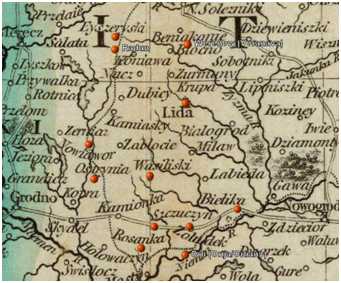 |
|
| Contents | |
| Lida Uezd Homepage | |
| Lida Uezd History | |
| Lida Uezd Towns | |
| Lida Uezd Maps |
|
| Searchable
Databases |
|
| Lida Uezd
during the Holocaust |
|
| JewishGen
Home Page |
|
| KehilaLinks
Home Page |
|
|
|
compiled by Ellen Sadove Renck from the sources at the bottom of the page Bialohruda/Belogruda/Belogrudy
and dependent villages of Bobowce,
Cibory, Dalekie, Dubczany, Gorniaty/Gornety at 5348 2511, Kulbaki,
Mochowecze, Olsew Wielki, Radziwoniszki/Radzvoniski at 5346 2506,
Rzepniki, Szczurk, Szczutniki, Tarnowszczyna
and estates and hamlets of Adruszki, Chielowka, Cwirbuty, Czytowszczyna, Dzitryki, Felicjanowo, Krystnowo, Kurhan, Leszczynowka, Oltew Maly, Ostep, Podzitwa, Polubniki, Szemiotowszczyzna, Zaloza In 1928, Bialohruda (Polish spelling) was designated as an osada (settlement or community), seat of Tarnow community office, in the Second Uchastok, Lida powiat, Nowogrodskie pow., Poland. The Justice of the Peace was in Lida and the Justice Court in Wilno. The 1928 population was 100. The railway station was 14 kilometers away in Bialohruda. The post office and telephone were in Bialohruda and telegraph in Lida. Bieniakonie had one Catholic church and mills. Slownik Geograficzny Krolestwa Polskiego:
p. 190 Bialohrud, small town, Lida powiat, 3
“m.” [mila? morg?] from Lida, in hilly area, on the
rivers Dzitwa and Niecuecza. Has Catholic parish church in M.B. [Maly
Bialohrud?], with wood (?) elevation 1609 from wojewode Jana Zawisze.
Bialohrud Catholic parish deanery in Lida with 1,922 souls
[parishioners]. See also Bialohruda (scroll down) Sources: If
you have Lida uezd
materials to share, please considering donating it.
If you read Yiddish or Hebrew, please contact us.
Records are
held both in Grodno and Vilna archives.For Lida records translation,
your tax deductible contribution by credit card via the secure server
at either group or by mail will grow our knowledge. For a $100
donation, you receive all these records translated two years ahead of
their posting on JewishGen. Every penny collected is used for Lida uezd
projects only. Records include censuses; family lists; marriages,
births, death records; prenumeraten lists; and more. Please contact Judy Baston
with any questions.For current translations, please see the ALD:
All Lithuanian Database and Belarus
SIG Database.
|
